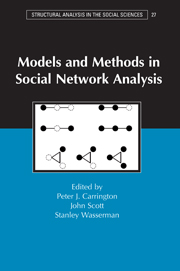Book contents
- Frontmatter
- Contents
- Acknowledgments
- Contributors
- 1 Introduction
- 2 Recent Developments in Network Measurement
- 3 Network Sampling and Model Fitting
- 4 Extending Centrality
- 5 Positional Analyses of Sociometric Data
- 6 Network Models and Methods for Studying the Diffusion of Innovations
- 7 Using Correspondence Analysis for Joint Displays of Affiliation Networks
- 8 An Introduction to Random Graphs, Dependence Graphs, and p*
- 9 Random Graph Models for Social Networks: Multiple Relations or Multiple Raters
- 10 Interdependencies and Social Processes: Dependence Graphs and Generalized Dependence Structures
- 11 Models for Longitudinal Network Data
- 12 Graphic Techniques for Exploring Social Network Data
- 13 Software for Social Network Analysis
- Index
- Structural Analysis in the Social Sciences
10 - Interdependencies and Social Processes: Dependence Graphs and Generalized Dependence Structures
Published online by Cambridge University Press: 05 June 2012
- Frontmatter
- Contents
- Acknowledgments
- Contributors
- 1 Introduction
- 2 Recent Developments in Network Measurement
- 3 Network Sampling and Model Fitting
- 4 Extending Centrality
- 5 Positional Analyses of Sociometric Data
- 6 Network Models and Methods for Studying the Diffusion of Innovations
- 7 Using Correspondence Analysis for Joint Displays of Affiliation Networks
- 8 An Introduction to Random Graphs, Dependence Graphs, and p*
- 9 Random Graph Models for Social Networks: Multiple Relations or Multiple Raters
- 10 Interdependencies and Social Processes: Dependence Graphs and Generalized Dependence Structures
- 11 Models for Longitudinal Network Data
- 12 Graphic Techniques for Exploring Social Network Data
- 13 Software for Social Network Analysis
- Index
- Structural Analysis in the Social Sciences
Summary
In this chapter, we discuss the importance of the concept of dependence in social network data. Dependence is usually treated as a technical statistical issue, but in the case of social networks, the type of dependencies that might be expected in the data reflect underlying social processes that generate network structures. Consequently, we argue that possible dependencies need to be thought about explicitly when modeling social networks. We present a hierarchy of increasingly more complex dependence assumptions and show how to represent these in terms of dependence graphs. We show how dependence graphs are used in exponential random graph (p*) models for social networks. The most commonly used dependence assumption for p* models is that of Markov random graphs, but we summarize new developments that introduce higher-order dependence structures, Markov assumptions constrained within social settings, and dependencies involving individual-level attributes. We conclude by conceptualizing our general approach in terms of social space, with different types of dependence structures construed as forms of abstract proximity between elements of that social space.
Social Phenomena, Networks, and Dependence
An event or process is a social phenomenon precisely because behaviors by the individuals involved are interrelated. The form of interrelation may be particularly complex. As Solomon Asch argued half a century ago, social phenomena have the reflexive quality of being psychologically represented in each of the participating individuals.
- Type
- Chapter
- Information
- Models and Methods in Social Network Analysis , pp. 192 - 214Publisher: Cambridge University PressPrint publication year: 2005
- 43
- Cited by

